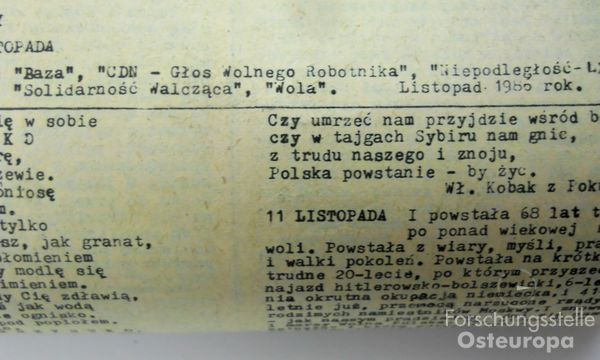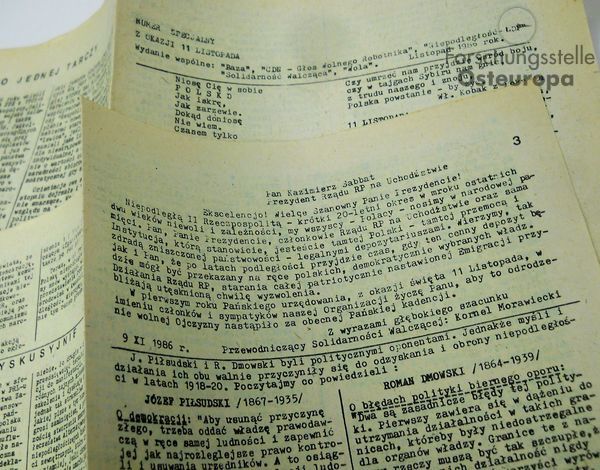Odesa-Tage 2025
Kolloquiumsvortrag
18:15 Uhr, / Zoom
Eka Tchkoidze (Halle) | Medieval History in Georgian Literature and Film (19 th -20th ct.). Some Aspects of Shaping Georgian National Identity
Discussion, 02.12.2025, 18:00, EuropaPunkt
"Occupation, torture, and violations of nuclear safety", with Rebecca Harms (former MEP), Roman Koval (Truth Hounds) and Yana Lysenko (FSO Bremen). Moderated by Eduard Klein (FSO Bremen).
Wissenswertes
Independence Day in the Underground
One hundred years ago, on 11 November 1918, Poland regained its independence. The Polish opposition celebrated the anniversaries of this event during the communist era.

Foto: Maria Klassen. Quelle: Archiv der Forschungsstelle Osteuropa, FSO, 02-134.
On 11 November 1986, five illegally printed newspaper editorial boards published a special edition on the anniversary of Poland regaining its independence in 1918. The document is worth presenting this month, because it shows that in the 1980s, Polish oppositionists celebrated the historic anniversary despite all the ideological and political differences between them. The situation of the opposition in communist Poland was unique. The dissident movement here was bigger than in other countries of the Soviet Bloc, more institutionalized and rooted in society. Thanks to this, it was able to take actions in the political sphere, not only symbolic, and in many cases influence the attitudes of the authorities. The circles and organizations publishing these underground magazines differed from each other in many ways. “The Base” and “The Independence” presented a conservative-liberal program. “Fighting Solidarity” aimed at a radical fight against communists alike to “To Be Continued – The Voice of a Free Worker”. “The Will” was rather connected to the mainstream of the Polish opposition.
The content of this special edition, which is today included in the collection of Tomasz Kontek in the Archive of the Research Centre for East European Studies at Bremen University, was also pluralistic. For example, the document shows both two characters, who symbolised two competitive traditions of Polish independence: Josef Pilsudski, the leader of the Polish Legions fighting in the First World War, and Roman Dmowski, the leader of the Polish national-democrats, who conducted diplomatic activities. These politicians were both opponents, and the traditions associated with them were often opposed. Their visions of Poland were very different. Piłsudski referred mainly to the concept of the state, Dmowski to the nation. Underground journalists, however, wanted to appreciate them both.

Jan Olaszek
Länder-Analysen
» Länder-Analysen
» Eastern Europe - Analytical Digests
Discuss Data
Archiving, sharing and discussing research data on Eastern Europe, South Caucasus and Central AsiaOnline-Dossiers zu
» Erdgashandel
» Hier spricht das Archiv
» Russian street art against war
» Dissens in der UdSSR
» Duma-Debatten
» 20 Jahre Putin
» Protest in Russland
» Annexion der Krim
» sowjetischem Truppenabzug aus der DDR
» Mauerfall 1989

